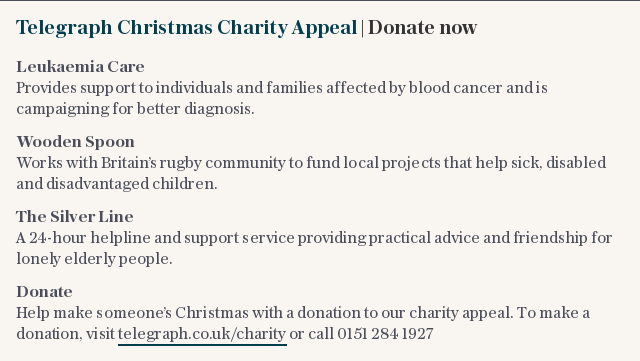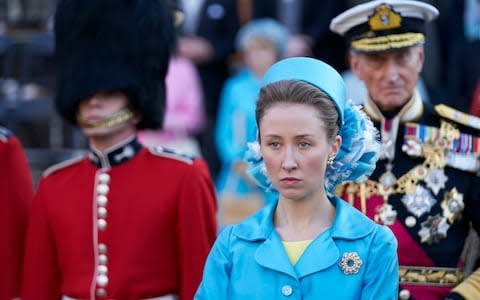Princess Anne: 'You don't need qualifications to make a difference'


There’s a scene in episode four of the latest series of The Crown in which we are introduced to the young Princess Anne for the first time. She strides through the halls of Buckingham Palace clad in skin-tight jodhpurs and riding boots, long brown hair waving behind her, summoned by her father who wants to deploy her as a PR weapon to justify (and increase) the level of public financial support for the crown.
“I know you value your privacy, but I think there’s a lot about you that they would like if they got the chance”, Philip pleads. “The fact is that you’re generally good value for money”. Anne raises a sardonic eyebrow in response. “It generally all sounds hideous,” she concludes. “But if you and the other reptiles insist”.
Fifty years later, and in real life this time, it appears nothing much has changed. Famously hardworking - last year she was the busiest royal, carrying out 518 engagements - Anne is still stoically doing her duty. You could still sum her up as she is later described in the same episode ofThe Crown, as “the most thrifty, feet on the ground, low profile, unpretentious royal we’ve got’.
Universally loved for her seemingly no-nonsense approach to life, the Princess Royal eschewed titles for her two children, enjoyed her own - extremely successful - equestrian career and shows no sign of slowing down, even as she approaches her 70th birthday next year.
Certainly when I meet her, it is at pace. She has come straight from another engagement, and clips briskly into our meeting, immaculately attired in an emerald-coloured suit, accessorised with a twinkling gold, chameleon-shaped brooch.
Her hair is perfectly puffed into its signature chignon, shoes polished, handbag over one crooked arm. Asked if she would mind having her photo taken she gives a “humph” and says, if we must. One slightly severe smile and one, two, three snaps of the camera later and we’re done, photographer dismissed with a wave of the hand. It’s all a little terrifying.
Awkward bit out of the way, however, and she suddenly becomes charm personified. As ever, because we are British, and this is how British people - even Royals - do small talk, we discuss the weather first. We are conducting our interview in an airy, quietly elegant upstairs room with large windows that overlook the inner courtyard of St James’s Palace.
A clock ticks comfortingly in the background; there is a shiny mahogany dining table at one end and a couple of low chairs and a sofa at the other. All is discreetly plush, but also a bit like a slightly staid, genteel hotel. It is also unfamiliar territory for the Princess Royal: she has had to move offices because of flooding.
Not climate change-related, she adds (we are speaking days after heavy flooding in South Yorkshire has made the headlines), but because a redesign of the layout of the road at the bottom of St James’s meant one of the kerbs was removed, and the ensuing rain came straight into the palace.
She almost rolls her eyes as she tells the story, before confiding that the weather is going to be “horrendous in a minute. It snowed at home [Gatcombe] yesterday - they cancelled Cheltenham for tomorrow!”
Conversation flows easily - from sport to children to how to be useful in society back to sport again. However, there is a subject she refuses to be steered on - the most recent season of The Crown (released three days after we meet), in which the young Anne played by Erin Doherty emerges as the super-sexy, sultry standout star.
Our meeting also occurs two days before Emily Maitlis’s bombshell interview with her younger brother Prince Andrew - so heaven knows what her take on that was. Having met her, I can imagine it would have been typically forthright and no-nonsense.

We are here primarily to discuss her work as patron of Wooden Spoon, one of the Telegraph’s Christmas charities, which raises money, via the rugby community, to fund life-changing local projects around the country that support disadvantaged children, or those with disabilities.
Rugby has long been a feature in Anne’s life - her son-in-law is former England rugby player Mike Tindall - but, she reminds me, she has been haunting the touchline since way before that.
“My son [Peter Phillips] played from early days, at prep school,” she points out. “They were unbeaten in one season.” Although, she adds, there was some “slightly poor behaviour by some of the parents on the touch line - I was laughing most of the time”.
One can just imagine her chortling into her collar at an over-enthusiastic father berating some poor little boy - although legend has it that she also once “tactically” interrupted a game by letting her dog onto the pitch, so she is perhaps not entirely innocent of parental influence.
Anne has remained a fan of the sport - she is patron of the Scottish Rugby Union, and thence became patron of Wooden Spoon. “The wooden spoon concept [of awarding one to the team that comes last] has been around for a long time, but rarely has anybody made it quite so constructive”, she declares. “It’s completely pot stirring - but perfectly, because it pot stirs in all the right places and really makes a virtue out of failure”.
Wooden Spoon’s range of projects - on which it often works in tandem with other charities - is large and varied: the princess refers to pioneering adventure playgrounds for children with disabilities, and the charity’s support of both the Carers Trust, another charity founded on her initiative, and Riding for the Disabled, one of the first charities she was involved with.
Is there a common thread to those causes she lends her patronage to?
“I think the common thread may have worn out some time ago,” she reflects wryly; “but I think approach might be a common one. I think [those charities she is involved with] are very pragmatic - they understand the need to respond to individual or local need and not say ‘oh, that’s the answer, we’ll do this for everybody’, because that doesn’t really work. You have to work with the people who live and work somewhere and have the most interest and need, and who will make the best possible use of that”.
Qualifications, she adds, aren’t everything - “it’s the ability to find people who really understand the issues and the difference you can make”.

The Princess may be patron of over 300 charities and organisations, and be the hardest-working royal, but she has no degree, and left school with a handful of O-Levels and two A-Levels. But she is quick with the facts, throwing out references to scientific studies, citing the statistics compiled by the Citizens Advice Bureau (another of her charities), questioning whether modern life is, in fact, too obsessed with qualifications, especially when it comes to the many volunteers she comes into contact with.
“I had this discussion only yesterday!”, she exclaims - “somebody said ‘do I need to have the right qualifications to be a volunteer’, and I said, by definition, you just want to be a volunteer! That’s the whole point! Having the qualifications is not necessarily what you’re looking for - you want somebody who is prepared to give up their time to help. And I think sometimes you need to get back to that point and say, thank you for wanting to help”.
She is equally dismissive of an unhealthy reliance on statistics, especially when it comes to supporting those in need. “Statistics can be useful, but you’ve got to be very, very careful about why you’re asking those questions.”
Not to mention the answers, which them enable the respondents to be put neatly into little boxes, in order to get grants. “I get really cross now if I get loads of statistics and I get the terminology - oh, they come from this area which is deprived, this area which is below poverty level. And I think, hang on a minute, you’re condemning a whole group of people, saying they’ve all got special needs because they come from there. Don’t label them as ‘oh it’s so unlucky you’ve come from there - you’ve got no hope’.
Many children labelled ‘disadvantaged’ are, she points out, “just children for whom life has been particularly difficult in some area - but their ability to grasp the opportunities and see where they can go with them is quite extraordinary”.
Team sports - like rugby - she says, have the great advantage of bringing people together, which creates a special environment, because different skills are needed. There’s a camaraderie to such a team that is unique, and that we have to come to terms with the risk element of such sports because “that’s one of the reasons why people do it”.
She dives off at this point into a study carried out by a German scientist on the perceived level of risk, and how all children are born with their own innate sense of risk-taking ability, but that as a society obsessed with health and safety culture, we’ve all but overridden that.

This then segues into a discussion of riding, and whether one should wear a crash helmet and then the observation that “the safer some sports get, the more idiotic sports they then invent on the other side - why would you do that? Maybe because there’s always going to be a group of people for whom risk-taking is part of their DNA”.
She then asks me if I’ve ever been to the hub of British skateboarding, in Corby (answer: no), where not everybody wears crash helmets (“And I thought that was quite interesting because it makes everything their responsibility. But it did look mayhem”) and then we’re back onto risks in sport, and why rugby players shouldn’t wear too much padding, because it actually increases the injury rate.
It’s all rather breathtaking. Only when we’ve been talking for a good 40 minutes and Anne starts to discreetly check her watch do I realise our time is up. We finish, as we started, with the weather, after I tell her that two of my three sons have just started playing rugby, and I’m finding it rather a chilly pursuit. “Good luck with that”, she says briskly. But remember, “there’s no such thing as bad weather, only inappropriate clothing”. And with that she is up and off, on to the next engagement.
Wooden Spoon, which works with Britain’s rugby community to raise money for sick, disabled and disadvantaged children, is one of three charities supported by this year’s Telegraph Christmas Charity Appeal. Our two other charities are Leukaemia Care, which provides support to individuals and families affected by blood cancer; and The Silver Line, a 24-hour helpline and support service for lonely elderly people. To make a donation, visit telegraph.co.uk/charity or call 0151 284 1927


